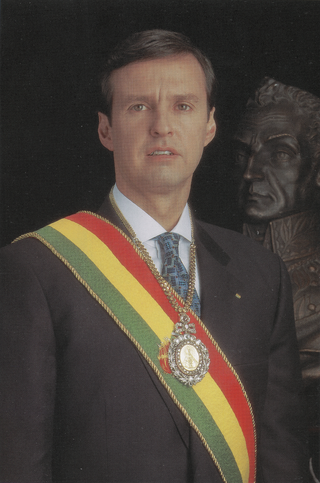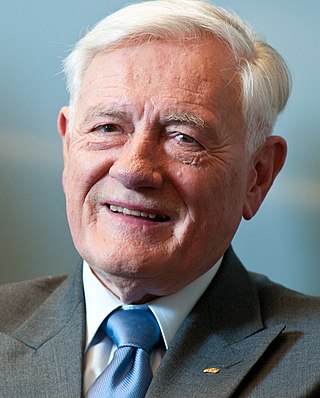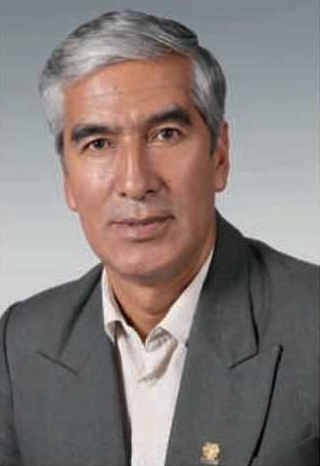Related Research Articles

Luís Carlos Prestes was a Brazilian revolutionary and politician who served as the general-secretary of the Brazilian Communist Party from 1943 to 1980 and a senator for the Federal District from 1946 to 1948. One of the leading communists in Brazil, Prestes has been regarded by many as one of Brazil's most charismatic yet tragic figures for his leadership of the 1924 tenentist revolt and his subsequent work with the Brazilian communist movement. The 1924 expedition earned Prestes the nickname The Knight of Hope.

Jorge Fernando "Tuto" Quiroga Ramírez is a Bolivian politician and industrial engineer who served as the 62nd president of Bolivia from 2001 to 2002. A former member of Nationalist Democratic Action, he previously served as the 36th vice president of Bolivia from 1997 to 2001 under Hugo Banzer and as minister of finance under Jaime Paz Zamora in 1992. During the interim government of Jeanine Áñez, he was briefly appointed from 2019 to 2020 as the country's international spokesperson to denounce alleged human rights violations by the previous government.

Valdas Adamkus is a Lithuanian politician, diplomat and civil engineer who served as the fifth and seventh president of Lithuania from 1998 to 2003 and again from 2004 to 2009.

The Plurinational Legislative Assembly is the national legislature of Bolivia, placed in La Paz, the country's seat of government.
Óscar Salas Moya was a Bolivian politician and trade unionist. A miner by profession, Salas Moya was a key leader of the Communist Party of Bolivia and a leader of the Huanuni miners union. The position of Salas Moya, then belonging to a younger generation in the party leadership, was strengthened in 1964, after the party had been deserted by Pimentel and Escóbar.
Néstor Guzman Villarroel is a Bolivian politician and trade unionist.
Román Loayza Caero is a Bolivian politician and farmer. He was a prominent leader in the farmers' trade union movement and one of the founders of the Movement for Socialism (MAS).
Gonzalo Aguirre Villafán is a Bolivian politician. A company administrator by profession, Aguirre Villafán obtained post-graduate degrees in Integral Development Planification and Agrarian Administration. He was the president of the Bolivian University Confederation (CUB) between 1978 and 1982. In 1985 he founded PROAGRO, an institution he directed until 1993. He was the manager of the Chuiquisaca Development Corporation (CORDECH) between 1993 and 1995. Between 1996 and 1997 he served as the General Secretary of the Chuquisaca Prefecture.
Raúl Angelo Porcel Gonzales is a Bolivian politician and journalist. Porcel was a member of the Potosí Regional Committee of the Christian Democratic Party (PDC) between 1977 and 1980. He was the executive secretary of the University Workers Trade Union at the UTF between 1978 and 1980, after which he served as the executive secretary of the Bank Employees Federation of Potosí between 1982 and 1993. In the bank employees trade union movement, he was the conflict secretary of the Bank Workers Confederation of Bolivia between 1983 and 1985.
Óscar Daniel Zamora Medinaceli was a Bolivian politician and lawyer. A communist student activist in his youth and leader of a failed Maoist insurgency in the 1970s, Zamora Medinaceli went on to become a senator, minister, mayor, ambassador and prefect.

The Revolutionary Left Front is a political party in Bolivia, founded in 1978.
Valda may refer to:

Severo Aguilar Gabriel is a Bolivian politician and trade unionist who served as a member of the Chamber of Deputies from Potosí, representing circumscription 41 from 2010 to 2015. A member of the Movement for Socialism, he previously served as a member of the Constituent Assembly from Potosí, representing the same circumscription from 2006 to 2007.

Ángel David Cortés Villegas was a Bolivian educator, politician, and trade unionist who served as a member of the Chamber of Deputies from Potosí, representing circumscription 37 from 2010 to 2015.

Luis Gallego Condori is a Bolivian lawyer and politician who served as a member of the Chamber of Deputies from Potosí, representing circumscription 39 from 2010 to 2015.

Samuel Plata Plata is a Bolivian auto mechanic and politician who served as a member of the Chamber of Deputies from La Paz, representing circumscription 22 from 2010 to 2015. Born in a peasant community in the Altiplano plateau, Plata scaled the ranks of traditional leadership, serving as president of the Chuncarcota school board, mallku of his Aymara township, and finally, jach'a mallku cantonal of the three ayllus in the Urinsaya Marka, the sector's highest indigenous authority. Plata's prominent local presence led regional peasant sectors to nominate him as their representative in the Legislative Assembly, with the Movement for Socialism sponsoring his successful candidacy for a seat in the Chamber of Deputies.

José Félix Mendieta Villarroel is a Bolivian politician and trade unionist who served as a member of the Chamber of Deputies from Cochabamba, representing circumscription 28 from 2010 to 2015.

Roberto Rojas Herrera was a Bolivian accountant, politician, and trade unionist who served as a member of the Chamber of Deputies from La Paz, representing circumscription 15 from 2010 to 2015. A member of the Movement for Socialism, Rojas entered political activity as a member of El Alto's neighborhood councils, serving as secretary of sports for the city's San Pablo Zone before presiding over the District 3 council from 2000 to 2009. One rung above, he served as secretary of organization of the Federation of Neighborhood Councils from 2008 to 2010. The organization's alliance with the Movement for Socialism facilitated Rojas' entry into the Chamber of Deputies. Following his tenure in the legislature, he returned to El Alto, briefly serving as regional manager of the state-owned water and sanitation company before finally retiring from public life.

Felipe Molloja Báez is a Bolivian politician and trade unionist who served as a party-list member of the Chamber of Deputies from Potosí from 2010 to 2015. Raised in rural poverty, Molloja developed his career within the Omiste Province's trade union structure, holding leadership roles in various local, provincial, and regional agrarian and peasant syndicates. In 1999, he joined the ranks of the newly founded Fearless Movement, with whom he competed for the Villazón mayoralty in 2004, taking second place and attaining a seat on the municipal council. For the 2009 general elections, as part of his party's alliance with the Movement for Socialism, Molloja was elected to represent Potosí in the Chamber of Deputies. Within months of taking office, the Fearless Movement split with the ruling party, with Molloja joining his compatriots in forming a small breakaway caucus in the lower chamber.

Carlos Felipe Parra Heredia, known professionally as París Galán, is a Bolivian drag queen, LGBT rights activist, and politician. A member of La Familia Galán, a collective of LGBT drag performers, Parra is the country’s best-known drag queen. He made history as the first-ever openly transgender individual to win elective office in Bolivia after being elected to the La Paz Departmental Legislative Assembly in 2015. To date, he is one of just two queer people and the second gay man in Bolivia to have held political office as a lawmaker, after Manuel Canelas.